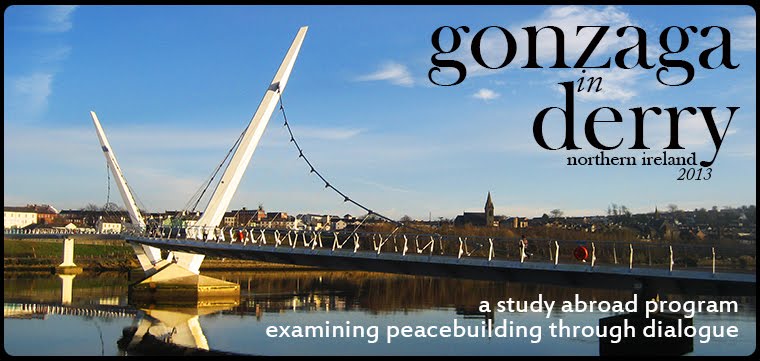 by Joan Fiesta
by Joan FiestaI find myself quite moved over several experiences from the last 36 hours. We are engaged in learning in an area whose people search for a new identity of peace. This identity of peace is one that many people in this area want; but there are those who remain openly polarized in their beliefs regarding politics and national identity.
Last night, which was our first full day of learning, several of us spent time in an obviously Nationalist pub in the Bogside. The tri-color flag of the Republic, along with several other national flags, hung on the ceiling. One could purchase a small "You Are Now Entering Free Derry" badge or refrigerator magnets to commemorate the 1916 Easter takeover of the General Post Office in Dublin. The pub and its patrons were colored with a deep and openly-displayed pride in the Irish Nationalist identity.
We got to talking to several of the patrons of the bar. Our conversations covered American football, Irish names (including what our names would be in Irish), and the significance of the tattoos on the arms of the patrons. People gave us snippets information on how to survive in speaking with Republicans. For example, this is not "Northern Ireland." It is simply "The North." The town we are in is to be known as "Derry," or, if one is to spell it in Irish, "Doire."
Tonight, a few of us tried to see if we could head back to our hotel using the wall that surrounds the city center. As we walked, we noticed the area known as "Fountain Estates." This is a Loyalist, working class area of the city area that is marked with blue, red and white painted curbs, the Union Jack flying in several locations, and two murals with obvious references to their Loyalist ideologies. One of the murals reads, "LONDONDERRY. West Bank Loyalists Still Under Siege. NO SURRENDER."
We noticed three fellows removing tattered flags from posts in the area. One flag was split in half and obviously worn. Its flag pole brackets seemed to be strong tape on a telephone pole. The removal process took about a half hour, as the tools that the young men were using were crude and not appropriate for a high-altitude undertaking. Though they were working late at night, they seemed quite secure in their actions in removing the flags; they did not run when a man with a dog walked up to them to talk. Their ease in this encounter leads me to believe that they were doing their community a service, rather than committing an act of vandalism. After removing the two most tattered flags in the area, they walked over to a mural, touched it and then each wrapped himself in the Union Jack for a photo opportunity. One of the men took the flags and placed them into a plastic bag. They all grabbed their tools and walked down the street into the estates.
(Unfortunately, my ideas remain assumptions on my part. Since we were not fully sure that these were not vandals, we did not go wandering up to the men to ask what they were doing. If they were in the middle of vandalizing the flags we would have been stupid to naïvely saunter up them and say, "Hi, guys! Whatcha doing?")
Identifying strongly with a side is extremely important to those we observed in each Nationalist or Unionist enclave. Their affiliations are tattooed on their arms and swathed on murals and street curbs. However, our photography teacher, Sinéad, made the poignant observation that outside of Northern Ireland, others are not sure as to which country citizens of the North should be affiliated and their identities outside the six counties that make up Northern Ireland are in question. Those from Northern Ireland may be considered British to citizens of the Republic. In England, those citizens of the North might be considered Irish.
Republicans or Nationalists have the advantage of having a geographic identity with those on the same island, but a local tradition of penal laws that stripped them of their rights. Unionists or Loyalists have had a local tradition of ascendency, but with the recent peace agreements, they are feeling more and more marginalized in a country of split alliances and tenuous economy. We have discussed several times the marches and violence in sectarian areas of Belfast over the reduced number of days that the Union Jack will fly over Belfast City Hall.
The work of the peace builders is so important to keep the history of violence from re-emerging in this time. Prison or death are the two consequences for seeking power through violence, according to Charlie and Jim, our two peace building teachers who spoke today. Jim lost 33 friends to sectarian violence. Those statistics are on par with a military regiment in a war. A young man named Ciaran, whom Charlie attempted to mentor away from the Real IRA, suffered both consequences. Charlie and Jim work towards making the identity of this land and its people one of peace because they have both suffered the consequences of violence. Without peace building, forgiveness, and a crystal clear understanding of the causes of the violence, Northern Ireland's identity will remain that of a violence the eyes of the world.

No comments:
Post a Comment
Note: Only a member of this blog may post a comment.